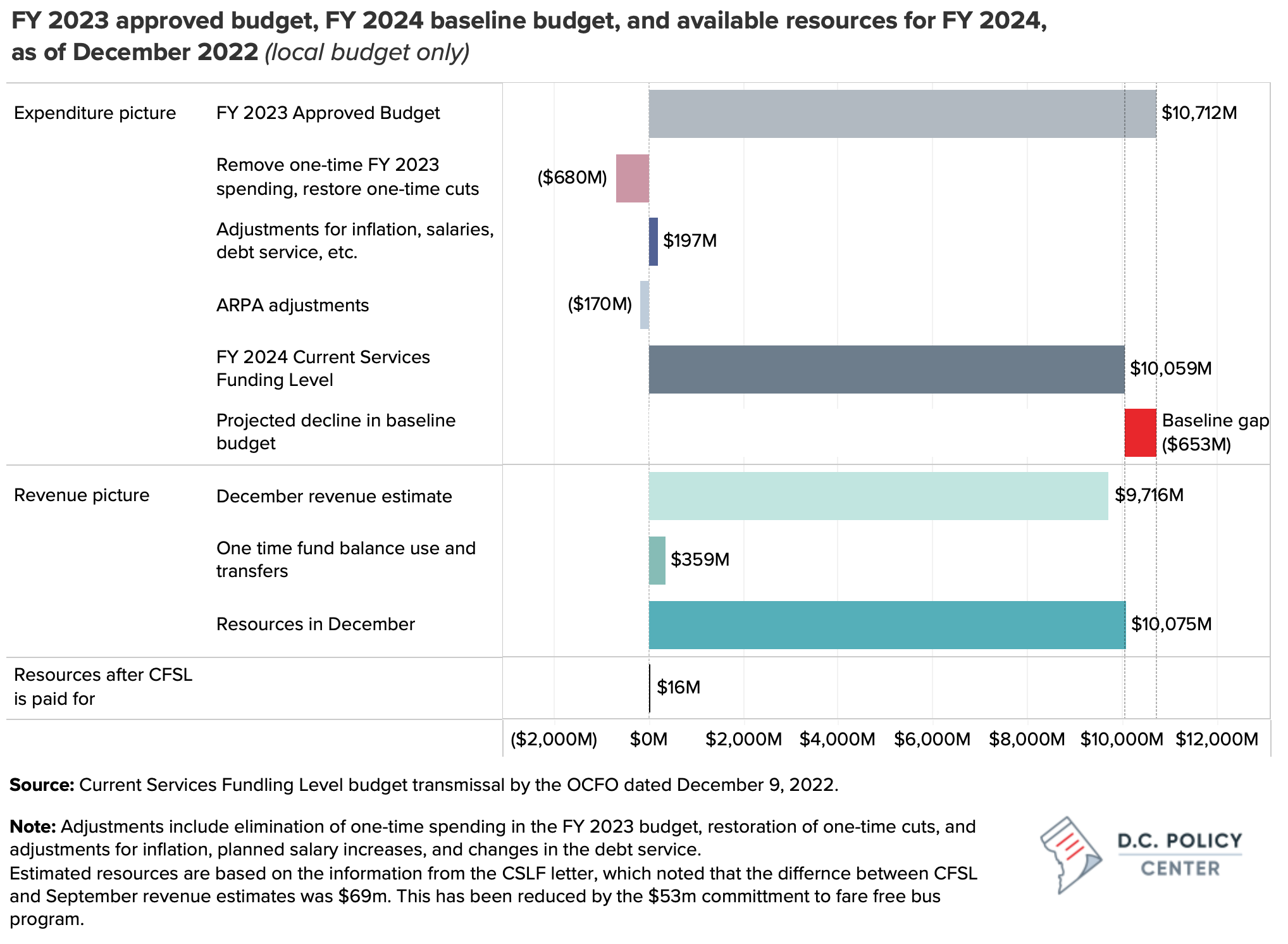Mayor Bowser will submit her budget proposal on March 22. While work on the budget began late last year, final decisions will have to wait for the CFO’s February revenue estimate. That estimate informs how much the Mayor has available to spend.
Policymakers face challenging conditions this budget season
D.C. faces conditions that it hasn’t seen for years—the past decade’s rapid growth trends slowing, together with federal pandemic assistance ending. The city’s revenue picture remains stable. But it not strong enough to make up for the end of federal COVID assistance. Thus, the city is already committed to spending much less in FY 2024 than it did in FY 2023, at least on paper.



Current Services Funding Level (CSFL): The city’s baseline budget
Each December, the CFO’s office produces the Current Services Funding Level (CSFL), or baseline budget.
The CSFL shows what it would cost the city to deliver the same level of services as last year, without any new policy changes. To arrive at the CSFL, the budget experts at the CFO’s office make the following adjustments:
- Remove one-time spending from last year.
- Add back in any one-time reductions removed last year.
- Add salary increases the city has committed to either through legislation or through union contracts.
- Adjust for inflation.
- Make necessary adjustments reflecting changes in debt service or the operating impact of capital expenditures.
The FY 2023 budget was $10.7 billion. The CSFL for FY 2024 is ~$10.1 billion.
D.C. has ample funds to cover the FY 2024 baseline budget
The December local revenue estimate (the most recent we have from the CFO’s office an updated estimate is released at the end of February) projects that the city will have ~$9.71 billion to spend in FY 2024.
The baseline budget is ~$16 million less than these funding sources:
$9,716 million (December revenue estimate for FY 2024)
+ $359 million (Fund balance use for FY 2024 approved last year)
– $10.075 billion (CSFL)
————————————————
$16 million (Excess recurring revenue)
Thus in theory, the city can do exactly what it did in FY 2023—except for the one-time commitments—and have $16 million to spare.
Keep in mind, the baseline budget doesn’t include important and popular programs categorized as one-time spending
But the CSFL assumes that all one-time spending planned for FY 2023 is going away. And the District tends to categorize some high-priority, popular programs as one-time expenditures. Let’s look at some of the $653 million in one-time spending in FY 2023:
- Housing Production Trust Fund ($354 million): More than half of one-time spending was HPTF subsidy, which has always been a year-to-year commitment but is a priority for the Bowser administration. It’s hard to imagine that the HPTF will be zeroed out.
- Human Support Services ($182 million): FY 2023 saw a bump in funding to the Departments of Human Services, Health Care Finance, and Health, largely to support pandemic-related needs. Need continues, and these increased supports will be difficult to remove.
- Public Education Cluster ($43 million): One-time increases to the Department of Parks and Recreation, DCPS, and public charter schools.
We expect to see at least some of these items to continue at some level of funding in the FY 2024 budget.
What could change this picture?
We won’t know what is in the Mayor’s budget until March 22. But we could expect the FY 2024 proposed budget to be larger than the CFSL, even if there aren’t any major new revenue proposals. Why?
Improved February revenue estimate from the CFO: The late February revenue forecast could show more revenue than the December estimate. This would give the Mayor more resources to restore some one-time programs from 2023 (or add new ones). Conversely, the picture could worsen if the CFO’s February forecast reduces the revenue.
FY 2022 revenue surpluses and/or underspending: The final audited numbers for FY 2022 (expected by very early February in the annual financial report) can give the Mayor one-time resources:
- The most recent number for FY 2022 revenue ($9.92 billion) is significantly greater than the approved budget for that year ($9.37 billion). This potential surplus of $550 million, alone, could make up for much of the one-time spending.
- And if there was underspending during FY 2022 (a common occurrence), that number could be even greater.
Expect updates from us once the annual financial report for 2022 and the CFO’s February revenue forecast are released.



FY 2024 budget calendar
January to early February: Annual Financial Report
Release of the final audited numbers for FY 2022
Late February: CFO’s Revenue Estimates
CFO releases updated revenue estimates: the ceiling for how much money D.C. has available in the upcoming fiscal year.
March 22: Mayor’s Budget
Mayor Bowser presents her FY 2024 proposed budget to the D.C. Council.
March 24: Public Budget Briefing
D.C. Council holds public briefing on the Mayor’s FY 2024 proposed budget and financial plan.
March 27—April 12: Committee Budget Hearings
Council committees hold budget hearings and gather public input. Find the full schedule here.
April 13: Full Council Budget Hearing
D.C. Council Committee of the Whole holds a hearing on all 4 budget bills:
- FY 2024 Local Budget Act of 2023
- FY 2024 Federal Portion Budget Request Act
- FY 2024 Budget Support Act of 2023
- FY 2023 Revised Local Budget Emergency Adjustment Act of 2023 (if submitted)
April 25-27: Committee Markup
Council committees make changes to the Mayor’s proposed budget.
May 3: Council Work Session
Final negotiations in the Committee of the Whole.
May 16: First Reading
Council’s first reading (vote) on:
- FY 2024 Local Budget Act of 2023
- FY 2024 Local Budget Support Act of 2023
May 30: Second Reading
Like all D.C. legislation, the Council has a second vote, or “second reading,” a few weeks after the first vote. This date will be the second reading (vote) on:
- FY 2024 Local Budget Act of 2023
It will also be the first (and only) reading on:
- FY 2024 Federal Portion Budget Request Act
- FY 2023 Revised Local Budget Emergency Adjustment Act of 2023 (if submitted)
TBD
The date of the second reading for the FY 2024 Budget Support Act of 2023 has not yet been published.
